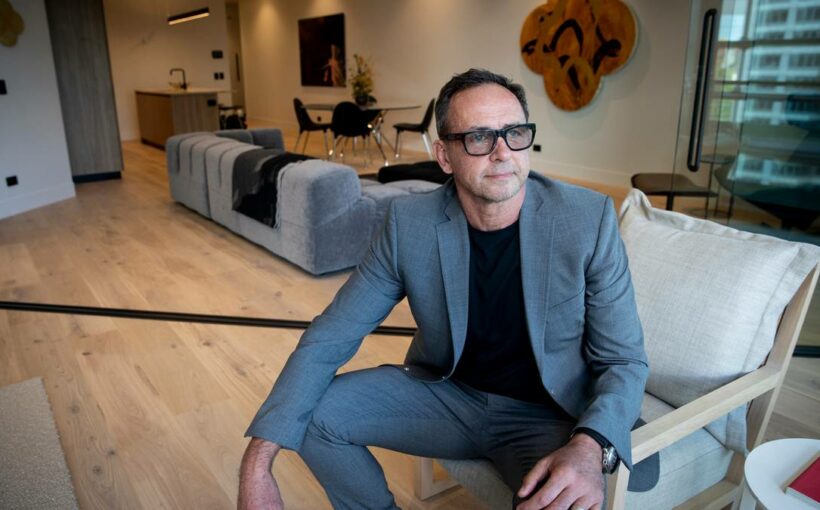The liquidation of the company behind Gary Groves’ $250 million The International property project in Auckland will be short $69.8 million, and a number of creditors are unlikely to be repaid in full.
Jeff Meltzer and Mike Lamacraft, of Meltzer Mason, issued their first liquidation report on Gary Mervyn Groves’ Sanctuary Developments No 8, which converted the ex-Fonterra world headquarters into luxury apartments.
Real estate agents, interior decorating firms and lawyers are among those named as claiming money from the failed business, whose sole director is Groves and is owned by Sanctuary Developments 2015.
The failed developer’s total estimated shortfall is $69,868,820.
Inland Revenue wants $20,288,420 for GST on apartment sales but there appears little prospect of it being paid because the liquidators say the shortfall matches what is owed.
Auckland Council and Watercare also appear but the report does not disclose how much they are owed.
Bayleys Real Estate, Charta Real Estate, Mint Real Estate, CBRE and Ray White Epsom are listed as unsecured creditors for work on the high-rise project which had a prominent profile at the time it was being done.
One of Groves’ companies, Sanctuary Developments 2000 is also a creditor.
But by far the biggest creditor is Tim Edney’s Waimauri Ltd which has first ranking security over debt shown in the liquidators’ statement of affairs as $87.4m.
That amount is offset by some assets so the final shortfall to Waimauri appears as $36m.
The offset comes from an estimated realisation from unsold units in The International, which the liquidators put at $51.3m.
Groves engaged Dominion Constructors to convert the ex-Fonterra headquarters at 9 Princes St in Auckland’s CBD into luxury apartments in a $250 million job and Donald Trump ex-aide Chris Liddell was said to have bought an apartment there for around $15m.
The Bank of New Zealand was owed $6.5m but has been repaid, and when the Sanctuary business went into voluntary administration in February Meltzer said there were no subcontractors owed any money because builder Dominion Constructors had also been paid in order to ensure they would continue with warranties.
“Sanctuary has no outstanding financial obligation or dispute with the builder Dominion Constructors and will focus on outstanding invoices from December 2020 onwards,” the statement said.
At the time of liquidation, creditor Chao Ming Cheng was also going to the High Court to liquidate the company. But because the liquidation had already occurred, that application was dismissed, Meltzer Mason’s report said.
J Chen is listed as claiming $11.6m.
All up, the estimated total shortfall to secured creditors is expected to be $47m before interest and costs, while the estimated shortfall to unsecured creditors is estimated to be $22.1m, resulting in the total expected losses to all those parties as $69.8m.
Accountant Anthony Appleton-Tattersall said the taxpayer would probably be left unpaid by several million dollars and others would also suffer.
“The chances of them getting anything back are effectively zero, with a significant shortfall for even the secured creditors. It’s not a great situation for anyone, but just the nature of the game that some ventures fail,” he said.
In February, Groves referred to a statement from his company, issued by PR firm Hustle and Bustle.
“As with many construction projects such as Commercial Bay and the Park Hyatt Hotel, unforeseen construction disruptions and Covid-19-related delays have been overcome, however, these delays have added significant costs. It has become clear that there will be a shortfall to pay off secured and unsecured creditors,” the Sanctuary statement said.
In 2017, the Herald reported Groves saying: “We’re building this project to a standard that Auckland has not seen before. We’re appealing to people who have previously lived in large, quality suburban homes.”
Groves, in the sector for 25 years, said he had developed more than 1000 apartments. The biggest project was a 314-unit Whitaker Place block, finished eight years ago but he has concerns about his sector and project cancellations.
“There are inexperienced developers involved at the moment and it’s one of the reasons for apartment projects not going ahead. Also, restrictive lending covenants with the banks and prices increasing for construction are other factors,” Groves said in 2017.
Asked in 2017 if construction costs might rise at The International, Groves said that was “a moving target, but we have bank funding.”
Source: Read Full Article

/cloudfront-ap-southeast-2.images.arcpublishing.com/nzme/NQI37N3IQVC3SSXAIZGLXMPTSE.jpg)
/cloudfront-ap-southeast-2.images.arcpublishing.com/nzme/XF3RMQMDTAAQMELKY4LP23A54U.jpg)
/cloudfront-ap-southeast-2.images.arcpublishing.com/nzme/G6EXW5WNL4ZQ4RPOV3Q4FLIKJI.jpg)
/cloudfront-ap-southeast-2.images.arcpublishing.com/nzme/FC2DPETWXPNTFCIRCYMKA2VJXU.jpg)